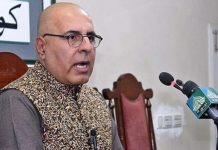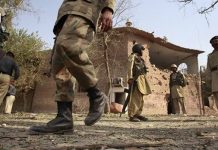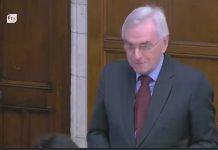by LAWRENCE SELLIN, PHD
On September 13, 2001, Secretary of State Colin Powell and Deputy Secretary of State Richard Armitage presented Lt. Gen. Mahmood Ahmed, a religious hardliner and then Director of Pakistan’s notorious intelligence agency, the ISI, with a list of non-negotiable demands that Pakistan:
Stop al Qaeda operatives at your border, intercept arms shipments through Pakistan and end ALL logistical support for bin Laden.
Grant blanket overflight and landing rights.
Permit access to Pakistan, naval bases, air bases and borders.
Provide immediate intelligence and immigration information.
Condemn the Sept. 11 attacks and “curb all domestic expressions of support for terrorism against the [United States], its friends or allies.”
Cut off all shipments of fuel to the Taliban and stop Pakistani volunteers from going into Afghanistan to join the Taliban.
Should the evidence strongly implicate Osama bin Laden and the al Qaeda network in Afghanistan AND should Afghanistan and the Taliban continue to harbor him and this network, Pakistan will break diplomatic relations with the Taliban government, end support for the Taliban and assist us in the aforementioned ways to destroy Osama bin Laden and his al Qaeda network.
According to the Washington Post at the time, “Powell and Armitage would be asking Pakistan to help destroy what its intelligence service had helped create and maintain: the Taliban.”
Pakistan accepted all seven demands and then immediately began to secretly backtrack from the agreement.
On September 15, 2001, Pakistani President Pervez Musharraf held a meeting with ISI Director Mahmood, Lt. Gen. Muzaffar Usmani, Lt. Gen. Jamshaid Gulzar Kiani, and Lt. Gen. Mohammed Aziz Khan. The military officers argued that Pakistan should not help the U.S. at all in its war against the Taliban and al-Qaeda. Mahmood stated, “Let the U.S. do its dirty work. Its enemies are our friends.” Musharraf countered that publicly agreeing with the U.S. would lead to billions of dollars in aid and the lifting of sanctions against Pakistan due to its illicit nuclear activities.
On September 19, 2001, just four days after agreeing to the ultimatum, Musharraf failed to condemn the 9/11 attacks or the Taliban or al-Qaeda during an important televised speech, “implying that Pakistan’s alliance with the US was only a temporary and opportunistic necessity. He said, ‘I have done everything for Afghanistan and the Taliban when the whole world was against them. We are trying our best to come out of this critical situation without any damage to them.'”
The Pakistani ISI would continue to supply the Taliban in Afghanistan with fuel, weapons, and even military advisers, until at least November 2001.
Prior to the U.S. attack on Afghanistan on October 7, 2001, Pakistan’s ISI Director Mahmood continued to meet with Taliban leader Mullah Omar and told him how to resist the U.S. and not to hand over bin Laden. According to journalist Kathy Gannon, Mahmood, having just come from meetings with top officials in the U.S., gave Mullah Omar information about the likely next move by the Americans. By then, Mahmood knew there weren’t going to be a lot of U.S. soldiers on the ground. He warned Mullah Omar that the Americans would be relying heavily on aerial bombardment and on the Northern Alliance. Mahmood gave additional information on targets likely to be hit, such as command and control systems and anti-aircraft defense emplacements and what types of weapons the U.S. would use against those targets.
The ISI informed Pakistani President Musharraf that the Taliban would hold out at least until the spring of 2002, and then would mount a guerrilla war. Encouraged, Musharraf allowed the ISI to continue to supply the Taliban on a daily basis.
Just prior to the U.S. October 7, 2001 attack on Afghanistan, so many fuel tankers and supply trucks were crossing the Pakistan-Afghan border in Chaman, Balochistan, regular traffic was shut down to allow ISI supplies through to the Taliban stronghold of Kandahar, where Pakistani military advisors remained until November 2001. A December 8, 2001 New York Times article described ISI-sponsored convoys of rifles, ammunition, and rocket-propelled grenade launchers for Taliban fighters crossing the Khyber Pass border from Pakistan into Afghanistan between October 8 and 12, just after U.S. bombing of Afghanistan began.
Jalaluddin Haqqani (Haqqani Network), who controlled the Khost region of eastern Afghanistan where most of bin Laden’s training camps and supporters were, was a CIA asset in the 1980s and met with U.S. officials soon after 9/11. Journalist Steve Coll said, “There was always a question about whether Haqqani was really Taliban, because he hadn’t come out of Kandahar; he wasn’t part of the core group. And it was quite reasonable to believe after 9/11 that maybe he could be flipped.” In early October 2001, Haqqani made a secret trip to Pakistan, where ISI Director Mahmood advised him to hold out and not defect, promising that he will have help. Subsequently, Haqqani decided to stay with the Taliban and continues to be a threat to U.S. and NATO soldiers in Afghanistan.
The U.S. was aware of Pakistani duplicity early on. Gary Berntsen, one of the first CIA operatives to arrive in Afghanistan, said, “I assumed from the beginning of the conflict that ISI advisers were supporting the Taliban with expertise and materiel and, no doubt, sending a steady stream of intelligence back to [Pakistan].”
The same pattern of duplicitous behavior by Pakistan has continued over the last sixteen years. And yet American political leaders and senior military officers remain puzzled as to why we have not won in Afghanistan.
Lawrence Sellin, Ph.D. is a retired colonel with 29 years of service in the US Army Reserve and a veteran of Afghanistan and Iraq. Colonel Sellin is the author of “Restoring the Republic: Arguments for a Second American Revolution “. He receives email at lawrence.sellin@gmail.com.































pakistan isi is the facrtory of terrorists
just making talibans
terrorist and making americans fool